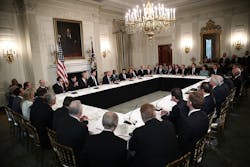Manufacturing CEOs Push Border Tax During Meeting With Trump
Authors: Shannon Pettypiece, Justin Sink and Matt Townsend
The chieftains of U.S. manufacturing pressed their case to President Donald Trump Thursday that imposing taxes on imports would lead to higher employment. He got their message loud and clear.
Just after meeting with the CEOs of Dow Chemical Co., General Electric Co. and other industrial giants, the president told Reuters he would “support a form of tax on the border” because it will “lead to a lot more jobs.” The president didn’t go as far as endorsing the tax reform plan backed by House Speaker Paul Ryan that has divided corporate America between importers and exporters.
“We spent time talking about a tax code that creates a level playing field for American companies,” Ken Frazier, chief executive officer of Merck & Co., said after the meeting, part of which was closed to the press. Frazier is part of the group of CEOs who sent a letter to congressional leaders this week in support of Ryan’s plan and its “border-adjustment tax.”
Republican leaders in the House argue a border-adjustment tax would benefit American manufacturing while providing revenue to make up for losses from reducing corporate tax rates. Trump has called it “too complicated” and said the White House would release its plan in coming weeks. Several Senate Republicans have also raised doubts. Opponents, including net importers like Wal-Mart Stores Inc., warn it will raise taxes on American consumers.
“This is the next zig of a zig-zag pattern,” David French, head of government relations for the National Retail Federation, said of Trump’s comments. “This is the beginning of a long process.”
Trump used the public portion of the meeting to reiterate some of his campaign themes, blasting what he called “unbelievably bad” trade deals and singling out trade deficits with Mexico and China. He vowed to punish companies that move jobs outside the U.S. and promised to squeeze more money out of government contracts. He said his talks with Lockheed Martin Corp. CEO Marillyn Hewson led to a $700 million reduction in the cost of Lockheed’s F-35 fighter jet.
“She’s tough, but it worked out well I think for everybody,” Trump said of Hewson.
Campbell, Corning, Nucor
Before meeting with Trump, the executives split into working groups to explore policy changes on topics such as taxes and trade, regulation, infrastructure and the future workforce. Joining them in the breakout sessions were administration officials, including Vice President Mike Pence; Gary Cohn, director of the National Economic Council; Treasury Secretary Steve Mnuchin; and Trump’s son-in-law, Jared Kushner.
Campbell Soup Co. CEO Denise Morrison, Harris Corp.’s Bill Brown, Johnson & Johnson’s Alex Gorsky and Emerson Electric Co.’s David Farr were among those who took part in the working group sessions with administration officials, who also included budget director Mick Mulvaney. In a meeting with Cohn and Transportation Secretary Elaine Chao, business leaders including Corning Inc.’s Wendell Weeks and Nucor Corp.’s John Ferriola discussed indexing gasoline taxes to provide more money for transportation projects.
Thursday’s meeting grew out of Trump’s December announcement of an advisory panel on manufacturing.
‘Very Encouraged’
Dow CEO Andrew Liveris, who is leading the panel, said afterward that he and the other executives were “very encouraged” by the pro-business approach being taken by the administration.
Taking part in a session on the workforce of the future, Liveris said there must be a “systemic fix” to address the shortage of workers prepared for jobs requiring skills in science, technology, engineering and mathematics.
“We have supply-side issues today,” he said, “half a million open STEM jobs that we can’t fill. We need to fill them with Americans.”
He also said community colleges need to provide more vocational training for “the noble trades,” which had been a priority of the Obama administration.
Trump has used previous meetings with companies to encourage corporate leaders to build their products in the U.S., offering tax breaks and lower regulation to bring down costs -- and warning that he wants to raise tariffs on products produced overseas. The heads of labor organizations, automotive firms, national retail chains, drug companies and airlines are all among the groups who have met with Trump in the West Wing in recent weeks.
Lockheed’s Hewson told reporters that Trump is ready to take quick action on streamlining rules for businesses. “It’s very important that we reduce regulations, that we eliminate those that are burdensome that are unnecessary,” she said.
